 |
 |
| |
|
|
| |
|
|
| |
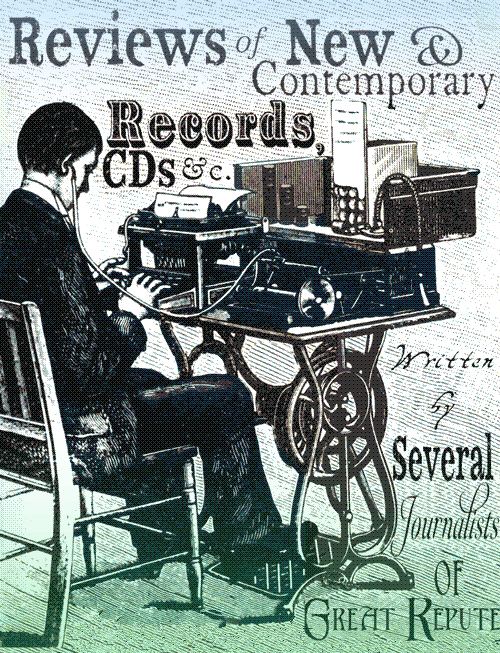 |
|
| =
January 2018 = |
|
|
| Sleepy Sun |
| Sendelica |
| Pugwash |
| Blitzen Trapper |
| Richard Warren |
| Dean McPhee |
| Stupid
Cosmonaut |
| Skull
Defekts |
| PlasticCrimewave Syndicate |
| Dave
Tomlin |
| Zong |
| Mugstar |
| Ehse
Records |
| Uffe
Lorenzen |
| The Cabin
Fever |
| Rivener |
| |
| |
| |
| |
| |
| |
| |
|
|
|
|
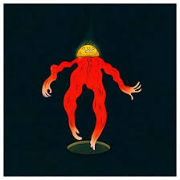
|
SLEEPY
SUN – PRIVATE TALES
(LP/CD/DL on dinealonerecords.com)
Private Tales is the fifth album from the San
Francisco quartet Sleepy Sun. The sound is 70s
Rock updated for the present. It shows an
evolution and maturation as the band continues to
grow and adapt to circumstances, such as vocalist
Bret Constantino’s relocation to Texas. While the
band started out playing more sludgy, stoner
riff-a-ramas that were quite endearing, it has
gradually honed its sound to well-crafted and
produced songs. I liken the situation somewhat to
The Black Angels (who Sleepy Sun have toured
with), who earlier in 2017 transformed their own
style, which was excellent but growing somewhat
repetitive, and made a quantum leap in
songwriting, arranging and production with “Death
Song.” Sleepy Sun’s transformation isn’t quite as
dramatic, but their growing attention to songcraft
and sound production clearly shows. Credit is
also due to engineer/producer Colin Stewart.
Starting slowly, with the droney “Prodigal
Vampire,” the album quickly shifts into gear with
the sprightly “Seaquest.” The catchiest song on
the album, Seaquest has a great chorus and a slick
closing guitar solo by Evan Reiss. Things turn
darker from there with “When the Morning Comes,” a
slow-burner about waking up from a nightmare and
gathering oneself together again. The song
eventually explodes in a David Gilmour-style
eruption before uneasily settling back down. It
segues into another dark slow-burner, “It’s Up to
You.” Starting out all Grand Guignol with the
Phantom at the helm of the church pipe organ and
harmonies reminiscent of CSN’s “Cathedral,” the
song once more erupts in a dramatic Floydian solo
courtesy of Matt Holliman. But Sleepy Sun is more
than a Floyd appreciation society.
“Crave” is another highlight, tale of ending a
relationship of dependency. It’s a guitar orgy
that dips between light and shade very
effectively, with lots of nice effects, like
burbling percussion, church bells and rippling
synths. “The Keys” feels unlike any other track
on the album. Initially almost an updated doo-wop
melody with harmonizing guitars, the lyrics tell
vocalist Constantino’s unusual personal tale of a
cherished piano coming between he and his wife
after moving from California to Texas.
“Demon Baby” is another favorite. I could
re-imagine this up-tempo cut as a Byrds song if
you throw in some 12-string Rickenbacker jangle,
that is before a stirring wall-of-sound middle
eight laden with phasing vocal harmonies kicks
in. “The Plea” is a quick, lovely acoustic piece
that says a lot in a small space. It moves
straight into closer, “Reconcile.” The song again
features surround-sound reverb-drenched harmonies,
and is a suitable number to round out the record.
Keep an eye on Sleepy Sun.
(Mark Feingold)
|
| |
|
|
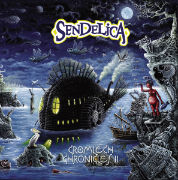
Home
|
SENDELICA
– CROMLECH CHRONICLES II
(LP on Fruits
de Mer Records)
I’ve become a big fan of Sendelica in recent
years as a connoisseur brand of Space Rock both
live in the sweaty confines of the Cellar Bar in
Cardigan amongst other places and also on a fine
array of records ranging in style from
Hawkwind-esque sonic adventures to expansive
electronic, kosmische influenced soundscapes.
The first record to bear the name ‘Cromlech
Chronicles’ came out last year and was recorded at
a studio near to an ancient burial site in West
Wales which gave the record its name ( a
‘cromlech’ being an ancient megalithic monument) .
The record was a recognisably Sendelican take on
Space Rock with extended instrumental workouts
touching on Pink Floyd and Hawkwind but also the
MC5 and jazzy grooves finding their way into the
heady mix. This record ‘II’ was recorded at the
same studio in the summer of 2016 and is very
definitely an alternative dish on offer at the
Sendelicatessen with two lengthy, meditative
pieces of music, played primarily on an array of
acoustic instruments.
The first piece ‘Ripples of The Megaliths’ is
quiet, minimal yet complex and totally lovely.
There is a definite Celtic tinged melody threading
its way through the piece largely played on cello
but there are also hints of far eastern sounds and
a raga like drone coming through at times. It
creates an air of mystery and imagination no doubt
influenced by the setting for the recording, which
could be a superior soundtrack to a Highland based
drama. There are lovely waves of minimal sound
with an ambience that is meditative and soothing
but also at times brooding and haunting.
Occasional bursts of saxophone, minimal
percussion, vocal chants and chiming guitar weave
into this soundscape and both punctuate and
elevate the underlying minimal soundscape to
subtly alter mood and sound and keep the listener
locked into and lost in this dream world. This is
perhaps the sound of a Celtic Popol Vuh playing
folk inspired kosmische but there are also lovely
nods to the instrumental side of David Bowie’s
‘Heroes’ in the way that the electronic undertones
and saxophone work together.
The second and final piece ‘Even Though My Mouth
Is Silent’ once again begins with a strong Celtic
feel through the cello creating a haunting melody
over the electronic soundscape and minimal
percussion at its core. Here however there is a
much more distinct ‘cosmic choral’ feel to the
electronic waves rather like the aforementioned
Popol Vuh and also perhaps ‘Phaedra’ era Tangerine
Dream. The sense of an ancient Celtic landscape is
perhaps much stronger here with greater drama and
brooding in the music. The saxophone once again
weaves its way through the piece and is evocative,
dreamy and occasionally jazzy in a good ECM kind
of way. In the latter part of the track the cello
takes on a slightly jazzier sound and the
percussion, whilst remaining gentle and
understated, becomes more prominent. There is a
growing far eastern feel to the melody as the
piece progresses but also to my ears a sense of
King Crimson in their ‘Discipline’ era albeit
subtle (‘Sheltering Sky’ came to mind). After a
brief chanted vocal the piece fades away to its
conclusion.
This is a beautiful record full of space,
elegance and a fine new direction for Sendelica to
follow when the mood takes them. It’s a relatively
short record but could be the perfect soundtrack
to lost and ancient landscapes and films about
them which haven’t yet been made. Somebody should
rectify that pretty soon.
(Francis Comyn)
|
|
|
|
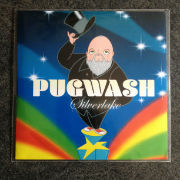 |
PUGWASH
- SILVERLAKE
(LP/CD from www.lonjinx.com
)
Pugwash have eight albums under their belts so
far, and this one differs from the rest because
Thomas Walsh, (the singer and songwriter for the
band) has teamed up with ex Jellyfish man Jason
Falkner, and sidelined the other guys in the band
for this outing. Jason has had an interesting
career so far, (I have a couple of his solo
albums, plus a few Jellyfish records) he has
played with some big names like Paul McCartney,
Beck and Eric Matthews, but crucially cites
Swindon’s finest XTC as an influence, which brings
us neatly to Pugwash, a band also heavily
influenced by the Swindon lads.
This album is pure pop music, eleven pristine,
three minute songs, bursting with catchy hook
infested melodies. Here I sit in the depths of
winter, I press play and ‘The Perfect Summer’
announces itself through the speakers like a balm.
Aah it’s lovely, an easy, loping tune, that is
soufflé light. Now the next track ‘What Are You
Like’ is just as summery in sound, but the lyrics
this time are bittersweet, introducing another
kind of blue. ‘Why Do I’ follows and is the
closest in sound this record gets to XTC and is
indeed close with regards to vocal style and
delivery. Bouncy, angular and infectious, Solo
Donald Fagan also springs to mind, could be my
favourite.
‘Better Than Nothing At All’ is a lovely pensive
ballad, slightly faded ‘What Did You Do’ bounces
along, catchy as a catchy thing, decorated with an
‘Any Colour You Like’ guitar figure towards its
conclusion. ‘Sunshine True’ is a pretty,
orchestrated pop song, wistful and charming. The
‘Needles And Pins’ ish/ Byrds sounding ‘Everyone
Knows That You’re Mine’ picks up the pace a bit
and is a great song. ‘Make It Yourself’ announces
its arrival, as a mid- paced rock song, complete,
with some excellent slide guitar, nice bass and
keyboards too. ‘Such A Shame’ is a soft lament,
which incorporates a playful yet deliberately
wonky guitar solo. ‘Easier Done Than Said’ is
another favourite, this one reminding me a bit of
the song ‘Sleeping Gas’ by the Teardrop Explodes.
Final song ‘Autarch’ ends the album on a high,
literally, being a tale of drug use and of
addiction. Sweeping strings, plus a super little
guitar solo. It provides us with a sad ending to a
highly accessible record.
(Andrew Young)
|
| |
|
|
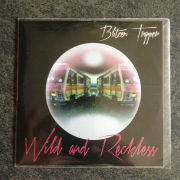
|
BLITZEN
TRAPPER-WILD AND RECKLESS
(LP/CD from www.lojinx.com
)
Portland, Oregon’s Blitzen Trapper are Purveyors
of top quality rock music, with a country/ folk
vibe, that some call Americana. They have released
quite a few albums so far, at least 15 and may
well have hit a purple patch with this latest.
‘Rebel’ the first song on the album is a fine
opener, a Johnny and June Carter Cash referencing
song. It tells of a square peg in a round hole,
the eternal misfit, full of great imagery of
finally settling on dealing that ‘ol cocaine as a
career choice, after trying out various jobs in
law enforcement and driving trucks. Title track
‘Wild And Reckless’ rockets along a fair pace, I’m
reminded of Tom Petty. It rocks in all the right
places, has some nice synth along with the
obligatory guitar solo. ‘Forever Pt 1’ adds a bit
of atmosphere and piano with some gospel tinged
ooh’s and aaah’s. ‘Joanna’ presents us with a
harrowing tale, it tells of a thirteen year old
girl, getting her revenge on a rapist, by shooting
and killing him, performed solo with acoustic
guitar, another fine murder ballad to add to the
collection.
‘No Man’s Land’ references Trans Am’s, has
wonderful succinct guitar solos, and rocks and
drifts along in a most amiable way, coming on bit
a like a southern Bruce Springsteen. ‘Stolen
Hearts’ moves us a bit towards Dylan and the Band,
it has some nice girly vocals, a cool slide guitar
solo too. ‘Dance With Me’ did not really appeal, a
bit lumpen heartland rock. ‘Love Live On’ has a
full band sound with piano, organ and guitar
prominent. ‘When I’m Dying’ is slinky and loosey
gooosey, it percolates along at a nice pace, some
fine fuzzed guitar squeezed into the proceedings.
‘Baby Won’t You Turn Me On’ has a lazy southern
feeling, with suitable imagery, like scarecrows
and storms, of twisting up another fat one. This
one’s a lot more acoustic in nature, organ and
dobro, with electric piano. ‘ Forever Pt2’ more
atmosphere, synths and found sounds, a bit of
molten fuzz guitar, with plenty of piano, (this
along with its earlier entitled piece link the
album together, lending it a feeling of being a
concept album). Final song ‘Wind Don’t Always
Blow’ echoes all that’s been before.
(Andrew Young)
|
| |
|
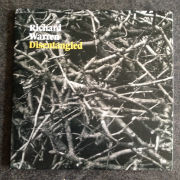 |
RICHARD
WARREN – DISENTANGLED
(LP from Hudson
Records )
The fourth solo album by Richard sees him trying
to wrestle with the art of simplicity, and offers
us a succinct album that deals in the master craft
of song writing. Ten little vignettes, delivered
in a style that is very much the same one as
pursued by Nick Lowe, who I am most reminded of,
as this album plays.
Opener ‘Only Always’ a chant accompanied by
spy-film guitar, atmospherics and a cooking little
rhythm section, spectral and practically
instrumental, shards of guitar notes peeling away
into the ether. ‘Last Breath’ here we are
introduced to his voice which is very much like
Nick Lowe or even Howe Gelb, a noirish fable of
dreams. ‘Simplify’ continues with the dark
confessional tone as if delivered by a down at
heel hack, outside looking in. ‘Silvertown’
ancient drum machine, eighties orchid lounge
vistas, guitar a la seventeen seconds, accompanied
by someone playing a jazzmaster nova accented
motif, purely instrumental. ‘No Way Back’ gets me
to thinking of Richard Hawley, with its laidback
charm.
‘Safekeeping’ another confessional, that would
not be to out of place on a Ry Cooder album, a cry
in your beer type weeper, that gets me feeling
pretty sad. It’s decorated with minimal
percussion and spacious slide guitar.
‘Disentangled’ takes us to the steamy swamplands,
an instrumental which gently rocks out, plenty of
fine slide guitar. ‘Mystery Land’ adds some
distortion and atmospherics, but it plods. ‘The
Deepest Well’ a cracked barroom tale for the wee
small hours, coloured by sympathetic electric
guitar. ‘Withered Tree’ an instrumental to finish
off the album, has martial drums, honky tonk
piano, heavily amped guitars and plays out like
some kind of warped house band in some flyblown
cantina way out west.
(Andrew Young)
|
| |
|
|
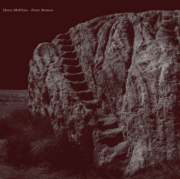
Home
|
DEAN
MCPHEE – FOUR STONES
(LP on Hood
Faire Records)
Dean McPhee has a way with a guitar which is hard
to describe easily. I’ve enjoyed seeing him
perform numerous times and his recordings to date
have shown a growing depth of character,
individuality and refinement which would grace any
collection. Rather than try to compare him
stylistically to particular players I prefer to
call it ‘South Pennine guitar soli’ which is a
perfect accompaniment to and reflection of the
desolate, lonely, mysterious and yet romantic
hills and moors around West Yorkshire and goes
some way to describing Dean’s fine playing and
compositions.
‘Four Stones’ is another step forward for Dean
and in its five tracks explores a range of musical
influences and styles. ‘The Blood of St John’ is a
wonderful start to the record with lots of
atmosphere and space. In some respects it reminds
me of the long introduction to ‘Shine On You Crazy
Diamond’ in the way that a beautiful and sparse
passage of solo guitar weaves itself through an
underlying ambient backdrop. There are also lovely
occasional nods to Malian guitar and desert blues.
‘The Devil’s Knell’ has a strong kosmische feel
with warm, simmering waves of guitar. I was also
put in mind of Bill Nelson’s more ambient solo
work of recent years especially where sparse but
elegant and stately picked notes float over this
backdrop creating a hypnotic and lovely sound.
‘Rule of Threes’ is perhaps the song most rooted
in traditional folk style melodies and is followed
by ‘Dance Macabre’ where a gorgeously soft slide
guitar sound soars above a repeating underlying
melody.
The title track is an extended piece of more than
fourteen minutes which to these ears creates a
strong ‘Celtic’ atmosphere at times, not just from
the guitar but from the subtle percussive
heartbeat to the song. It has a sense of drama and
I can imagine this piece of music accompanying a
road trip through mysterious wide open landscapes
and big skies in Ireland or Scotland or perhaps
just as satisfying as the soundtrack to a daydream
in the South Pennine moors.
This is a well crafted series of songs and
soundscapes from Dean and a great addition to an
already impressive body of work that is well worth
exploring.
(Francis Comyn)
|
| |
|
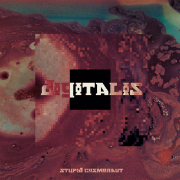
Home |
STUPID
COSMONAUT
– DIGITALIS (LP/DL
from
www.dronerockrecords.com)
Hailing
from that rich seam of psychedelic
inventiveness that is the North West of
England, the band formed by core duo Sam Read
and Steve McNamara in 2016 turn out their
second vinyl release for Drone Rock Records, a
label that’s fast joining the likes of
Cardinal Fuzz and God Unknown as one that just
doesn’t seem able to swing and miss.
Not
that there is much swinging or indeed rock in
evidence here. Plenty of ambient head-messing,
mind, which is all well and good in our sweet
little world. The fluvial and floating opener
‘Field Trip’ (quite!) puts one immediately in
mind of Astralasia or the more cerebral and
sedate school of kosmiche. It also sets the
theme for Digitalis
around which weaves a series of
intriguing and at times intricate variations
of light and shade. ‘Offline’ for example is
much edgier fare, supplemented with popping
percussive blips which add some succulent meat
to an already nourishing bone marrow
(vegetarian and vegan imagery also available
on request) while ‘Rephlex” showcases the
Cosmonauts’ ready proclivities towards more
expansive deep space exploration.
‘Post
Human’ reaches further into an unfathomable
cosmic void, sounding for all the otherworld
like a wordless Depeche Mode doing a pretty
reasonable take on one of King Crimson’s early
and more prog-worthy workouts. The title track
will thrill those who yearn for a little heavy
industry to ground their seas of sound, topped
off with delightful little arpeggio sprinkles
to garnish a dense but flavoursome fruit cake
(look, blame Christmas). ‘Sadness and
Euphoria’ is exactly that, an achingly
beautiful, melancholic front-piece building
gradually to something altogether more nimble,
upbeat and optimistic while still keeping its
feet planted on terra-darkwave.
Repeated
listens reveal manifold layers to explore and
in which to immerse yourselves. Overall, the
effect must be akin to being in a chill out
room/aural drunk tank at a doom metal
festival. Do such things exist? Then point the
way.
(Ian
Fraser)
|
|
|
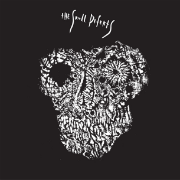
Home |
SKULL
DEFEKTS
– S/T (LP/CD from http://www.thrilljockey.com)
Something dark and satanic for you to mill
around, while taking just a minute to remember the
fallen. For this, we are told, is to be the last
Skull Defekts, release. A revelation when first
experienced by your scribe at Supersonic in 2011
this is a band who deserve to be up there near the
top of that list when the roll-call is read for
great Swedish bands (of which we know there to be
many).
And the good news is that despite - or maybe
because of - the absence this time of Daniel
“Lungfish” Higgs’ on vocals (his role here
confined to the album’s artwork) the band seems to
have been inspired to scale a creative peak, the
result of which is their most appealing collection
of compositions.
Molten, cybernetic and dystopian, ‘A Brief
History of Rhythm’ goes straight for the
jungle-ar. Imagine the next Terminator being
scored by the production team for Disappearing
World if you will. ‘Clean Mind’, too, cuts to a
chase you know you’re not going to win, welding
no-wave and math rock with an 80s Cult vibe while
‘The Dance’ throws playful sounding Afro rhythms
at a toxic concoction of revamped Bauhaus and Einstürzende
Neubaten. Three, four, hit the floor. Thud.
Maybe not the best time to blood a new member
just as you are about to call it a day but a warm
welcome anyway to Mariam Wallentin, whose vocal
contributions in particular add a delicious and
defining new twist to the already considerable
sonic palette. At one point on the outstanding and
oh-so powerful ‘Slow Storm’ the spoken word
delivery morphs into a kind of space whisper.
Fleetingly you have a sense of a black clad and
possibly black-hearted Gilli Smyth cooing over
molten Magma, hard wired to a death star. The
lustre has long since left the Glitter Band and
‘Powdered Faces’ is what may be left. A pounding,
post-innocence hulk of a song with primitive
beats, long, single chords and another sterling,
centre-stage performance from Wallentin.
Even what, on first listen, seem more lumpen and
linear (‘All Thoughts Thought’) still seems imbued
with a fresh sense of purpose and urgency. ‘A
Message From The Skull Defekts’ is a massive
statement on which Wallentin plus long-term core
members Joachim Nordwall, Henrik Rylander
and
Daniel Fagge Fagerström hit warp factor several
and career into a hellishly rapturous abandon
before what seems destined as the last ever
Skull Defekts offering, the ironically titled
‘The Beauty of Creation’. It reeks of inexorable
finality, packed with loads of dramatic
descending chords and what sounds like Syd
Barrett fronting Joy Division. Then it is
curtains (black ones, inevitably).
If you’re going to go out then you may as well do
so on your shield having made your defining
statement. It’s always best to bow out when you
are still at the top of your game. Only time will
tell if they make it stick. Meanwhile as
valedictions go, this will do perfectly.
(Ian
Fraser)
|
|
|
|
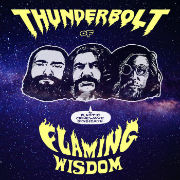
Home
|
PLASTIC
CRIMEWAVE SYNDICATE – THUNDERBOLT OF FLAMING
WISDOM
(LP on Cardinal
Fuzz Records)
Plastic Crimewave Syndicate have come onto my
radar this past year or so with an almighty bang.
Having greatly enjoyed a previous self titled set
released on Swordfish Records, I had high hopes
for this record and what a stunning set it is.
The regular trio of Plastic Crimewave (Steve
Krakow), Cosmic Jru and Jose Bernal are joined on
this outing by some inspired guests with Bil
Vermette on synths, Whitney Johnson playing viola
and in particular Bruce Lamont whose sax playing
is a major feature of the record. Together they
cook up an awesome spacey, pysch rock stew
heartily flavoured with free jazz improv, acid
rock and post punk ingredients.
Starting proceedings in overdrive, and why not?,
we have ‘Ghost Of Dread Reaction’, a raucous
opener with free sax squalls and incendiary guitar
spitting out a speaker splitting acid rock riff.
An echoey vocal not unlike Mark E. Smith would
sing if fronting the MC5 or The Stooges floats
over the top of this maelstrom. It’s a thrilling
track and one of the most eye popping opening
tracks I’ve heard for some time.
‘Future To The Ancients’ follows and wisely does
not try to compete in the noise department. What
we have instead is a stroke of genius taking us
back to kosmische influenced post punk times
around the turn of the 1980s with mournful guitar,
moaning synths, a throbbing bass and drum patterns
worthy of Joy Division and Public Image Limited in
their Metal Box era for the first half of the
song. As the track builds up momentum in its
middle section, swirls of synths, screaming and
ghostly vocals with a hard hitting yet jazzier
shuffle to the drumming take over with a soaring
guitar solo bringing a touch of Hawkwind to the
party before winding back down to a fade. I’m also
reminded of Pere Ubu in the overall air of
mystery, desolation and otherworldliness in the
song which is a very good thing. One of the finest
tracks I’ve heard in a while in my humble opinion.
‘Wasted All the Time’ is the album’s ‘pop’ song
and perhaps it stands out in style and feel from
the rest of the record albeit not in a bad way.
With its big singalong chorus and guitar riff it
sounds like the collaboration between The Stooges,
Butthole Surfers and REM which unfortunately never
happened.
Next up we have ‘Vast Beyond’, a muscular Space
Rock gem. After a brief harmonica trill and
setting out a ‘One Of These Days’ style memorable
bassline the track moves along courtesy of an
insistent rhythm and guitar riff with that
wonderful bassline and an occasional snippet of
harmonica coming up for air every now and then .
Once again the saxophone plays a big part in the
sound bringing a late 1970’s new wave touch rather
than the jazzier skronk of earlier tracks. A
satisfyingly head nodding and foot tapping slice
of organised mayhem.
The finale is another massive high point of this
remarkable record in the eleven minutes and more
of ‘No Place’. Its dirge like start with deep
almost screaming but not quite spoken horror movie
incantations (at times not unlike Nick Cave at his
more unleashed) leads us into a swelling and
swirling heavy psych rock where the saxophone once
more stands out in the drama punching away at the
front and threading through the whole track with
some great soloing over the howling cacophony
below. This stunning piece of music keeps building
in intensity and more than once sounds like it’s
about to fall apart into chaos before it takes
another instrumental change in direction all
within a solid groove. We are taken on a wild ride
through punk, prog, free jazz and improvisation,
kosmische, and psych through its twists and turns.
A final free skronking outburst where the band
sound like they are falling downstairs heralds a
return to the ominous dirge bringing this
astonishing track to a close. Acid Mothers Temple
would be proud of this creation.
A short album at a little over thirty minutes but
it packs so much interest and sheer joy into that
time. Unconditionally recommended for your
listening pleasure.
(Francis Comyn)
|
| |
|
|
Home
|
DAVE
TOMLIN - TALES FROM THE EMBASSY: COMMUNIQUES
FROM THE GUILD OF TRANSCULTURAL STUDIES
1976-1991
(Strange Attractor Press, pbk, 2017, ISBN:
9781907222566)
Whilst there have been some excellent recent
tomes chronicling the rise and fall of the 1960s
UK counter culture, few have concentrated on the
nuts and bolts reality of its constituents,
putting often-espoused alternative philosophies
into reality, and walking them like they talked
them. Jill Drower’s wonderful account of the
Exploding Galaxy commune and its activities in
North London found voice in her 99 Balls Pond Road book and now comes an equally worthy addition,
Dave Tomlin’s Tales
from the Embassy.
As the Samuel Pepys of the Underground, Barry
Miles so perceptively puts it in his intro to this
heavyweight edition (nigh on 500 pages), ‘The
ideas we discussed in the Sixties were not just
ideals; many people actually put them into
practice. These tales are the best account I’ve
read of trying to live that life’.
Dave Tomlin was there at the beginning as the
counter culture took seed in London in the early
mid 60s and will be known to some as a musician
who founded both the Giant Sun Trolley (a free
form outfit that would play the graveyard shift at
the UFO Club) and its successor the more widely
known and recorded Third Ear Band. One night in
1976, Dave and a bunch of squatters entered the
Cambodian Embassy on the periphery of Regent’s
Park – it was an opulent residence that had been
vacated in the wake of the Khmer Rouge’s
revolution a couple of years before. Over the next
15 years Tomlin and a motley crew of chums would
occupy this building and in the process of doing
battle with the likes of the local council,
utility companies and Foreign & Commonwealth
Office, lived out a successful experiment in
social living and also created a vehicle for
alternative music and other art forms in the shape
of the Guild of Transcultural Studies.
Split roughly into two halves, the first follows
Tomlin and friends (all given thinly fictionalised
names – Tomlin the narrator is Jubal Smith and so
on) as they take up home in this unusual abode and
intermingle with both straight and hip society,
treading a thin line between organised living with
rules and a more anarchic freewheeling approach
(check out how they deal with the disruptive
Buddhist fascists, The Three Psykos for instance).
More well-known figures like John Hopkins (Scipio
Hawkins) and poet Harry Fainlight (Harry Flame)
flit in and out of the story at various points
too. Having formally established the commune, its
ideals and activities (recounted in the form of
numerous sub-chapters which read rather like diary
entries), Tomlin also delves into his pre-Embassy
days with priceless accounts of the early Notting
Hill/Ladbroke Grove scene (including the Free
School) and Soho beat/jazz days. It’s staggering
to read just how much the Guild contributed to
London culture of the 80s – all manner of jazz,
classical and world musicians passed though its
portals including the legendary Master Musicians
of Joujouka, whilst all kinds of other events took
place including a short-lived series of talks on
subjects as diverse as hair, Guy Fawkes and
Shakespeare entitled Nuts in May!
The second half of the book chronicles another
key aspect of the longhair lifestyle – travel and
the open road. Firstly, we join Dave and a bunch
of hippie gypsies led by real life Count, Sir Mark
Palmer and an assortment of caravans and horses as
they travel the highways and byways of South West
England meeting real-life traveller folk,
belligerent town people and all manner of crazies
including the Chelsea set down for a weekend
roughing it. It’s a lovely gentle sometimes
hilarious interlude
The second account is of Tomlin’s bonkers 1966
trek out to the Island of Fernando Po in
Equatorial Guinea by turns quite alarming then
side-splittingly funny as our hero runs out of
money, loses his girlfriend and has to learn the
ropes of the sailor life in order to make it back
to his beloved West London. In doing so, Tomlin
proves himself a hugely resourceful man!
Finally, he ties up everything up with a gripping
account of how as the squatters’ occupancy meets
its final test at the Royal Court of Justice in
the Strand on St Crispin’s Day at the hands of an
unforgiving government department.
The book’s structure and Tomlin’s writing style
may take a little time to adjust to but after a
while the pages are turning themselves as you get
more and more immersed in an incredible parallel
world, that sadly no longer exists. This is heady
stuff indeed and worth investigating.
(Nigel Cross)
|
| |
|
|
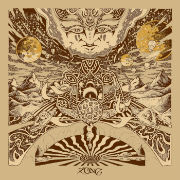
Home
|
ZONG – ZONG
( LP on Cardinal Fuzz or Download from bandcamp
)
Zong are a new three-piece outfit from Brisbane,
Australia, consisting of Henry Bennett on drums,
Michael Grinstead on Bass and Zac Anderson on
guitar. This is their debut album consisting of a
pressing of 500, of which 300 are destined for
Europe and 200 for Australia. The wonderful cover
artwork gives a promise of what is to come in this
album.
The music is deep, dark, moody, intense rock with
a definite trace of psyche running through its
veins.
The album throws us straight into the mood with
‘Cosmic Embryo’ starting out with rhythmic primal
beats before evolving into a spiralling guitar and
drum driven power flight; ‘Arcane Sand’ brings a
complete change of mood with a deep, mystical,
Middle Eastern feel to it; in ‘Giant Floating
Head’ the influences of Black Sabbath and Hendrix
are most noticeable bringing a deliciously dark,
doom laden edge to the slow powerful drums;
‘Return of the Alien King’ is a slab of
improvisational genius with soaring guitar riffs
gently building as the track picks up pace. The
false ending two thirds of the way through, which
moves the track into a completely different zone
is a lovely touch and beautifully executed.
This is an album of finely honed stoner rock with
more than a hint of doom, think Black Sabbath,
jamming with Hendrix, brought bang up to date by
the addition of a large dose of modern stoner from
the likes of Carlton Melton, Earthless &
Electric Moon, and you won’t be far off.
(Steve Judd)
|
| |
|
|
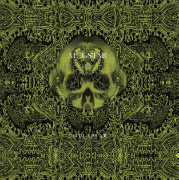
Home
|
MUGSTAR
– COLLAPSAR
(2 x LP Evil Hoodoo www.evilhoodoo.bigcartel.com)
There are many out there who owe a lot to this
band – musicians, labels, venues and smart-arse
writers among them. Indeed the list of credits on
this collection of singles and rarities, spanning
a decade and half, highlights just how massive
their footprint has been. We at Terrascope love
them, of that there is no secret.
Showcasing the not inconsiderable talents of core
members Steve Ashton, Neil Murphy, Peter Smyth and
Jason Stoll – the latter two are currently taking
time out of the band - and strikingly packaged, Collapsar
is often the sound of a band finding its
feet and just occasionally bumping into the
furniture. Much of the material featured here is
gloriously primal and pulsating route 1 psych,
full of tribal tub thumping, squalls of guitar
noise and murky, deep sonar bass straight out of
the Church of Hawkwind. In fact one of the many
debts we owe to Mugstar is In Search Of
Hawkwind album, their curated album of
Hawks covers, some as good as the originals, on
which they enlisted the likes of Acid Mothers
Temple, Bardo Pond and White Hills. Their other
obvious influence – a heavy one in whatever
context you define it – is Black Sabbath. “Quelle
surprise”, you might say, because doesn’t everyone
these days. Well, yeah, except the influences here
are less of the sludgy, stoner template and more
of some of the dark, witchy material lurking
beneath the surface of some of those early Sabs
albums.
As befits a mostly instrumental band, Mugstar
have never been short of good song titles. ‘My
Babyskull Has Not Yet Flowered’, ‘Man With
SuperSight’ and the punning and now poignant
‘DikSik’ are guaranteed to draw in the curious.
The first salvos are high adrenalin fun, packed
with moshes aplenty but just as you think it may
all be getting a little linear and telegraphed,
out of nowhere comes the deliciously dark and
dystopian cybernetic nightmare of ‘Blue Shift’.
Essentially six minutes of eerie, thrilling
experimental noise collage, if the light hasn’t
already come on then prepare to be blinded. By
contrast ‘Technical Knowledge As A Weapon’, an
alternative recording to the one which featured on
the …Sun…Broken album, chucks in some
Jon Lord organ. Now the main reason why Deep
Purple, in many respects the more accomplished,
varied and best of all the proto-Metal bands are
sometimes scoffed at, is Jon Lord’s organ. Me?
I’ve been drinking for years to forget it. Now I
have to drink some more.
Not until the third side do we get our first real
taste of vocal and then we get in spades. An
indecipherable anguished yelp from Peter Smyth on
‘Flavin Hot Rod’ evokes the most psychotic
surf/garage punk rock band that never lived. His
desperate but compelling vocal punctuating ZZ
Top’s ‘I Got The Six’ also contains notes of The
Birthday Party and Gallon Drunk. He then crawls
further up the walls of the panic walls, sounding
like Mark E Smith on a greedy-guts diet of the
brown acid on the Peel session track ‘Object’,
which also brings to mind Hey Colossus circa Happy
Birthday. This, as they say, is the kit.
The biggest curve ball here, though, is a take on
‘Tam Lin’, Smyth’s flattish delivery an early
portent of this 2016 solo acoustic album. Full
marks not only for trying but pulling it off.
Listening to the original again it’s obvious that
it begs for the folk-metal treatment, that
combination of melody and hobbled beats with
variation of light and shade. So there’s nothing
not to like here folks, and purists be damned. A
melodic almost west coast opener to side 4,
‘Mascon’ succumbs to the band’s time honoured
abrasiveness leaving it in corrosive shreds. Steve
Ashton’s propulsive drumming drives the strange
affair that is ‘Flotation Tank’ with its slowed
down talkie vocal and we round off magnificently
with ‘Bardo Head Finder’ recorded as part of the Axis
session but sounding like it could have been a
prototype of ‘Flemish Weave’ from 2016’s
exceptional Magnetic Seasons, featuring
some epic riffing underscored by Stoll’s trademark
Rickenbacker bass and highlighting Murphy’s
flowing yet fiery guitar lines.
Being around for almost 20 years makes
Liverpool’s Fab Four (well I can’t think of
another one, can you) the daddies of a UK psych
scene that has burgeoned in the years since just a
few of us thought we were the only ones left
ploughing not terribly straight furrows. We should
therefore be content for them to rest on their
laurels and take whatever course their currently
fluid line-up takes them. But then at the end of
the day we are insatiably hungry for more.
Now feed us again.
(Ian Fraser)
|
| |
|
|
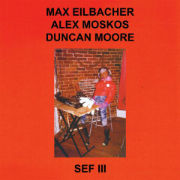
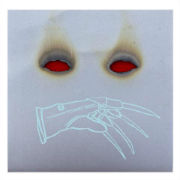
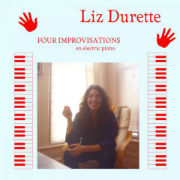
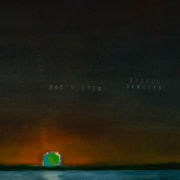
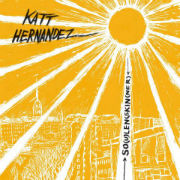
Home
|
MAX
EILBACHER/ALEX MOSKOS/DUNCAN MOORE - SEF III
MUDBOY - NIGHT EYES
LIZ DURETTE - FOUR IMPROVISATIONS ON
ELECTRIC PIANO
SCROLL DOWNERS - HOT WINTER
KATT HERNANDEZ - SO(U)LENSKIN(NER
(LPs from Ehse
Records )
Always interesting, always original and very often
challenging, Ehse Records have been releasing fine
music for many years and this latest batch
continues that tradition, five albums that insist
on being heard with open ears.
First up, “Sef III” features spoken word,
synths and tape manipulation creating a collection
that rides that strange place between wake and
sleep, the weird, surreal monologues, cloaked,
undermined and enhanced by the sounds around them.
Take, for instance, “I'm Sitting in a Room”, a
strange tale of clowns, gas, and transformation,
the words slowly lost in a cloud of abstract
sounds and alien melodies, the text offering
uneasy visions that are re-enforced by the music.
On the shorter, instrumental “Interlude” ,
the sounds are given full rein to swarm through
your head like an old book of photographs
discovered in an old attic that you have never
been in before. After these two pieces, “Cut-Up
Music” is a bit of a departure being as described
on the label, sounding like a host of hip hop
albums falling down the stairs before encountering
some old beat poet with a pair of scissors and too
much whiskey. Jolly fine it is too and much fun
can be had trying to recognise the samples, the
ever changing nature of the piece ensuring plenty
of listening pleasure.
Over on side two, the fun continues with
“Bad Sesh at the Cafe”, the vocals setting the
scene before we are taken into someone else's
dreams courtesy of the sounds of the sea and more
tape manipulation, the sounds alien and
industrial, soft and swirling, the track always
evolving and engaging. Finally, “Running Up the
Score” follows the now familiar template, the
words taking centre stage, a radio play for the
sleepless, streams of consciousness that hook you
in, ending a collection that reveals different
layers every time.
Taking as its inspiration “A Nightmare On Elm
Street” and utilising a huge pipe organ converted
into an electro-acoustic instrument, “Night Eyes”,
the latest offering from Mudboy is
not for the faint-hearted, a dark shimmering work
that creeps and crawls across your brain, almost
inaudible voices writhing with the Gothic ambience
of the music, minimalist chords and melodies
creating flickering candle flames in your mind.
Somewhere towards the middle of the music (end of
side 1, beginning of side 2) the music becomes
much darker, more intense plunging the listener
close to their worse nightmares, trapped under a
shroud of pulsing sound and wailing souls, the
intensity building to an almost overwhelming
crescendo, before mercifully fading,
Housed in a silkscreen cover, with burnt out
eyes and complete with poster and monograph on the
nature of sound in dreams, this package is a work
of art that will be treasured for years to come,
especially at Halloween, when you can frighten the
trick or treaters right out of their comfort zone.
Easing our frazzled brains and shredded
nerves, Liz Durette explores the
textures and tones of the Rhodes Piano on her
latest album, the music soothing and beautifully
light. Mixing shades of Jazz, Classical, folk
motifs and the occasional moment of dissonance,
the four improvised pieces are a delight to the
ears, the three tracks on side one seemingly
melting into each other to create a shimmering
musical backdrop to your life, softly spoken and
very uplifting. Over on side two, there is only
one long piece which treads the same sonic path as
the previous side, a slow walk through sun-lit
forest, waving meadow of evening beach watching
the sunset. Never overbearing or too demanding,
this album will delight your senses when you need
some time out from the cares of the world.
Treading a line between stoner, noisy psych
and shoegaze, the music of Scroll
Downers is a sleazy, off yer
face ride that deserves plenty of volume.
Starting your album with feedback is always a
winner in my book and “Two Clowns” doesn't
disappoint as it slowly accelerates away with
distorted guitar and the fine vocals of Lexie
“Mountain” Macchi, although the following “Shake
Off The Rays” takes thing into another level, a
glorious wall of noise that makes me happy, a
heady mix of Sonic Youth and Patti Smith, the same
blend found on the slower haze of “Hendiatricola”,
a psychedelic and dense track that trips out
beatifully before “I Want To believe” brings you
back to earth with a grungey bite of punk energy.
Over on side two, the same recipe reaps the
same rewards, four more tracks of noise, melody
and creativity with “Find The Stone” being a
personal favourite with its distorted riff and
dirty demeanour, the whole thing brought to a
close by “Hot Winter” introduced some of the
dirtiest guitar noise I have heard for some while,
thicker than treacle and just as sweet, the track
barely holding together as it stumbles through a
swamp towards its own oblivion, excellent stuff
that makes you want to play the whole thing again
and again.
Finally on Ehse Records, Katt
Hernadez beguiles and intrigues with a
series of acoustic violin improvisations ranging
from dancing notes that scuttle across the room
through to droning scrapes and squeals that are
sometimes a challenge to listen to, especially on
“II”, the piece that closes side one. Throughout
it is amazing to hear the range of sounds created
on a single acoustic instrument, the stuttering
scratches on “III” adding extra texture, whilst
“IV” taps into folk music being much more familiar
to the ears, the short and delicate stutters of
“V” leading you out into silence as the album
finally fades. Maybe not something that is going
to get played very often but well worth hearing
for those into abstraction, experimentation and
adventures in sound.
So, five very different albums that give your
ears and brain an excellent musical workout, all
beautifully packaged and sounding mighty fine. (Simon
Lewis)
|
| |
|
|
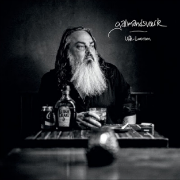
Home
|
UFFE
LORENZEN – GALMANDSVAERK
(LP from www.badafro.dk
)
When it comes to popular music in general, and
rock in particular, English is the undisputed
lingua franca. Other languages are available of
course but some fare better than others. Take
French, for instance. An expressive and quite
beautiful language, it’s too messy for the strict
idioms and meters of most beat music. German on
the other hand may be less immediately attractive
on the ear but the harder consonants and more
staccato delivery lend themselves to all manner of
noise, from opera to techno to heavy rock.
Thankfully in this respect the Danes are close
neighbours and not-too distant cousins of the
Germans. The spellcheck bothering album title
means “act of madness” in Danish which thankfully
doesn’t reflect Uffe Lorenzen’s decision to
jettison his Baby Woodrose brand or sing in his
native tongue. A brave move perhaps in terms of
international profile – English speaking journos
have been known to be sniffy towards Welsh
language cross-over acts after all. In Denmark
though the guy is a legend (there’s a recent
documentary about him) and one would therefore
assume him to be on pretty safe ground at home.
Here, Lorenzen has eschewed the more traditional
but invariably thrilling psych rock approach of
Baby Woodrose for something altogether more laid
back and organic sounding, with acoustic guitars
providing the root instrumentation around which
all the all the old folk hippy paraphernalia is
arranged – flute, sitar, table, hurdy gurdy, jaw
harp, and the occasional intimation of twittering
synth.
‘Dansker’ (Dane) sounds like early 1970s Alan
Stivell missing in action during the mushroom
season, it’s a quite fetching and affirming
composition, with Lorenzen’s more strident vocal
delivery balancing out the rather blissful
sounding accompaniment. ‘Rimets Tyranni’ is
jauntier and more upbeat, but still guaranteed to
bring a wistful smile to the chops of those who
may well yearn for a simpler, more innocent and
indeed analogue age. For as well as going a little
easier on the amplification there is little or no
sign of arid, digital airbrushing.The occasional
urge to stretch out is indulged, such as the
introduction of electric guitar on ‘Ridset Plade’,
although here the result is more Pulp than Pink
Fairies. However this works best when it jettisons
all the accoutrements of electricity, as on the
stripped down pairing of guitar/vocal and flute
with the merest hint of percussive tapping on
‘Flippertos’ for example. Occasionally there is
synthesis of both. The eastern drenched ‘På Kanten
Af Verden’ (‘On The Edge Of The World’, if you
want to know) by contrast could almost be two
songs as the languid Revolver style sitar melodies
yield to something much more frantic and
exhilarating in the final third.
‘Sang Om Merværdi’ kicks off the second side with
a riff heavily reliant on Love’s ‘A House Is Not A
Motel’ and in fact you can imagine Arthur Lee all
over this. The upfront presence of jaw harp works
surprisingly well too (imagine Tommy Hall
forgetting his jug one night “but it’s ok guys,
I’ve got this”). After the shimmer and gleam that
befits a song entitled ‘Ny By’ (New City) comes
one of the true highlights of the album, the
gorgeous ‘Min Skygge’, just guitar, voice, violin
and an overwhelming tendency to sing the chorus of
‘Space Oddity’. And so it goes, another couple of
semi-acoustic workouts (the first of which, with
mellotron and squally guitar, could have graced
some of Julian Cope’s post-major label output)
while the closing ‘Blues For Havet’ is an
outstandingly tasty stew of laid back west coast
with more than a taster of the Indian subcontinent
in the seasoning.
Altogether satisfying on the ears and who cares
if most of us don’t understand a word of it.
That’s our problem not his.
(Ian Fraser)
|
| |
|
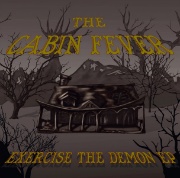
Home |
THE CABIN FEVER – EXERCISE
THE DEMON
(EP from https://thecabinfever.bandcamp.com/album/exercise-the-demon-ep)
Animal mask wearing (and
therefore kindred
spirits of our own Simon Lewis) Los Angeles
Anglophiles, The Cabin Fever, revel
in the sort of shoegazing that makes one
wistfully nostalgic for 90s UK indie
music.
Hallmarked by the hushed,
breathy
vocals of principal songwriter Sean Moriarty,
opening diptych ‘BLSH’ and ‘Simon
Says’ epitomise the lushly languid arrangements
and a hint of marketability
which should put them on nodding (out) terms
with more discerning radio playlists.
The narcotic ‘Trucrime’ too is as neatly
constructed and well-layered as a neat
terrine. These are strong melodies for sensitive
souls while never so stirring
as to over excite the pulse. Nurse, you can hold
the screens
‘His People’ with its Andy
Summers
guitar plucks and big chorus might have been a
little outside my discomfort
zone were it not for the slight offbeat. The
lengthier autobiographical, slow-cooked
exorcism of the title track (can you tell what
they’ve done there?), meanwhile,
comes complete with the sort of subtle and
complementary string arrangement
that punctuates much of the EP. Bonus track
‘Tony’s Song’ is probably the best
thing here, though, a heady, swelling mix of
sound superimposed over the
brooding trudge of the central motif and that
understated vocal delivery.
It’s a half hour or so
well spent. Men
of melancholy mystery - we await with interest
their next move.
(Ian Fraser)
|
|
|

Home |
RIVENER - S/T
LP from Twin Lakes
Composed
on-the-fly, with no overdubs and little edits this record finds the duo
of Paul Belbusi (guitar, keyboards, percussion) and Michael Keifer
(drums) raising their freak flag high, as they take us on a journey far
away from the norm, a trip both cosmic and slightly unsettling at times.
Opening track “Noiren” has the feel of being trapped on an ancient
space craft that has lost any power of flight, slowly drifting away
from the galaxy, the hopeless crew merely surviving oblivious to the
beauty and wonders around them, the music sounding like a slow motion
Soft Machine, rambling experimental psych with a Jazz undertone and a
softness that envelopes you.
On “It Takes A Pillage” the sounds stretch out even
further, the guitar wailing and dancing across dust storms, one foot in
the ocean the other reaching for the sun itself, sounding like a
magical hybrid of Man and early Tangerine Dream, all you have to do is
immerse yourself, things remaining the same for the noisier “Rainbow
Turned to Stone” which ends side one in a flurry of sound and visions.
Creaking and groaning, “Xool” is the sound of organic machinery, the
rhythms of the machines constantly changing yet creating a hypnotic
universe that washes over you and threatens do de-stabilise everything.
Warmer in tone and quite possibly the album's centrepiece, “Discoveries
Of Fire (Saints, Preserve Us)” is a Floydian romp that is inventive and
beautifully played, the musicians listening intently to each other as
the fire up the engines and float away across vast areas of space, the
music seemingly coming from somewhere else in time, leaving you
reaching for the volume button, the track ending with a brief feedback
drenched guitar that you wish was around for longer.
To end, “Tsardana” is sweet and gentle, a warm embrace of Eastern
tinged guitar and rolling percussion/drums, the sound filling the room
with light coating your dreams with energy and making you smile. (Simon Lewis) |
| |
|
|
|
|
 |
|

